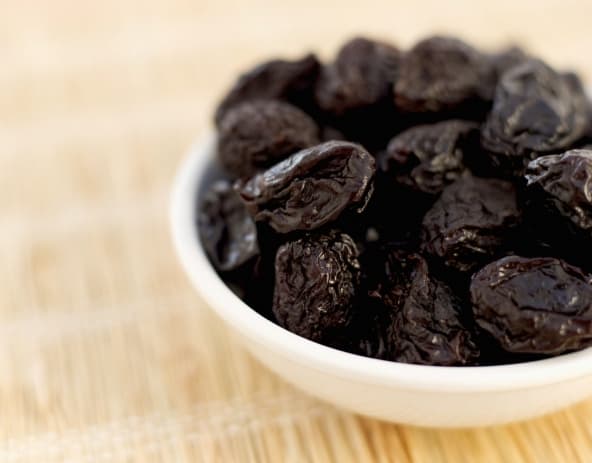
The more scientists study the causes of age-related illnesses, the more it seems they discover the vital role the foods we eat can play in preventive medicine. It has been well-documented that osteoporosis particularly affects post-menopausal women, but until recently, researchers have been unable to pinpoint a specific food that may help reduce the risk of the development of osteoporosis. A new study published on the Florida State University News site suggests that the humble prune may be nature's best "preventive medicine" against osteoporosis.
Florida State University's Bahram H. Arjmandi and researchers from Oklahoma State University tested 2 groups of women for a period of one year. All of the 100 study participants were post menopausal, putting them at greatest risk of developing osteoporosis. Fifty-five of the women were instructed to eat one hundred grams of prunes (about 10) per day while the control group of 45 was instructed to eat 100 grams of dried apples. Both groups were also given daily doses of calcium and vitamin D.
What the Study Found
At the conclusion of the study, all participants were examined to determine their bone mineral density. Participants who ate prunes "had significantly higher bone mineral density" in both the spine and the ulna (one of the two long forearm bones) than those who consumed dried apples. According to Dr. Arjmandi, this was at least partially due to the unique ability of prunes to "suppress the rate of bone resorption" (breakdown). While resorption is a continuous process, as we age, the rate at which it occurs tends to exceed the rate at which new bone growth occurs. In women, this process begins at menopause or at around the age of 55, while in men it begins at about the age of 65.
The Importance of Prunes in the Prevention of Osteoporosis
As Chairman of Florida State University's Department of Nutrition, Food and Exercise Sciences, Dr. Arjmandi states that he has "tested numerous fruits, including figs, dates, strawberries and raisins, and none of them come anywhere close to having the effect on bone density that dried plums, or prunes, have." As a result of the findings of this study, he recommends that all older women and men start making prunes a part of their daily diet, starting with two or three per day and gradually increasing the numbers to around ten. While an estimated 8 million post-menopausal women in the United States have osteoporosis, another 2 million men have the disease. "Don't wait until you get a fracture or you are diagnosed with osteoporosis," he recommends. Prunes may be all it takes to prevent the onset of the condition and the need to take medication to control it.
How Prunes Can Alleviate the Detrimental Effects of Osteoporosis
Osteoporosis is the most common lifestyle-related bone disease in adults, affecting people who lose bone mass faster than they can replace it. Approximately one in four Australian women over 75 suffers from this condition as their bone density declines rapidly. There are many health benefits of prunes to your health, including preventing bone loss and osteoporosis. A daily intake of 100 grams of prunes, as shown by the study above, is a great way to assist bone metabolism, as well as supporting a balanced diet.
Prunes are good for your health, especially bone health, as they contain essential vitamins and minerals like calcium, antioxidants and fibre. Eating 100 grams of prunes per day offers 227 mg of calcium, which reduces the risk for osteoporosis. Its high level of antioxidant activity, thanks to its significant amounts of polyphenolic compounds, reduces oxidative stress, which may contribute to bone density loss. By stimulating osteoblast activity, these compounds also contribute to growing new bone tissue.
The fruit's healthful polyphenolic compounds are most abundant in its skin and seeds so it's best to eat it whole, not juiced or pureed. Prunes are also an excellent source of vitamin A that supports the body's osteoblast activity, as well as vitamin K that prevents alterations in bone metabolism and reduces the risk of osteoporosis. The benefits of both fresh and dried plums on bone health go beyond promoting bone formation. Their beneficial effects also include maintaining strong bones until old age.
The Positive Effects of Prunes on Your Daily Diet

A plum diet, when combined with leafy greens, plant-based beverages, nuts, cheese and other dairy products can be an effective treatment for osteoporosis and its symptoms, including:
- Back pain
- Bad posture
- Loss of height
- Broken bones that heal slowly or not at all
In addition to improving bone strength and the health of women with osteoporosis, several clinical studies also found prunes to be one of the best functional foods that offer many beneficial effects, including:
- Lowering blood pressure
- Controlling blood sugar levels
- Preventing constipation, diarrhoea, irritable bowel syndrome and other digestive problems
- Improving brain health
- Maintaining supple skin
- Warding off bladder infections
So, if you want to achieve peak bone mass and maintain healthy bones until you're old and grey, stick to a balanced diet that includes whole prunes and juice concentrates sourced from fresh plums. Besides taking advantage of the positive effects of prunes on your body, you can rest assured that they don't come with any adverse effects. There's no better way to stop the prevalence of osteoporosis than by eating healthy and doing weight-bearing exercises so that you increase your lumbar spine bone mineral density without growing too much fat.
Check out this recipe for stewed plums that can help jumpstart your plum diet.
Originally published on Jan 09, 2012









